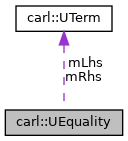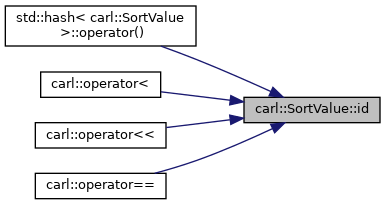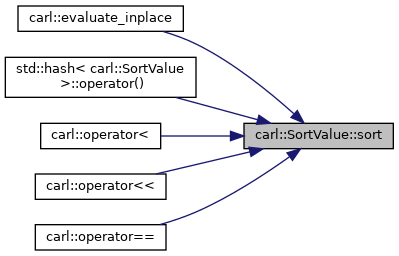carl::SortValue Class Reference
Implements a sort value, being a value of the uninterpreted domain specified by this sort. More...
#include <SortValue.h>
Collaboration diagram for carl::SortValue:

Public Member Functions | |
| SortValue () noexcept=default | |
| const carl::Sort & | sort () const noexcept |
| std::size_t | id () const noexcept |
Private Member Functions | |
| SortValue (Sort _sort, std::size_t _id) | |
| Constructs a sort value. More... | |
Private Attributes | |
| carl::Sort | mSort |
| The sort defining the domain in which this value is. More... | |
| std::size_t | mId = 0 |
| A unique id to identify this sort in the sort value manager. More... | |
Friends | |
| class | SortValueManager |
Detailed Description
Implements a sort value, being a value of the uninterpreted domain specified by this sort.
Definition at line 22 of file SortValue.h.
Constructor & Destructor Documentation
◆ SortValue() [1/2]
|
inlineexplicitprivate |
Constructs a sort value.
@parem _sort The sort.
- Parameters
-
_id The id of the sort value to construct.
Definition at line 39 of file SortValue.h.
◆ SortValue() [2/2]
|
defaultnoexcept |
Member Function Documentation
◆ id()
|
inlinenoexcept |
- Returns
- The id of this sort value.
Definition at line 56 of file SortValue.h.
Here is the caller graph for this function:

◆ sort()
|
inlinenoexcept |
- Returns
- The sort of this value.
Definition at line 49 of file SortValue.h.
Here is the caller graph for this function:

Friends And Related Function Documentation
◆ SortValueManager
|
friend |
Definition at line 24 of file SortValue.h.
Field Documentation
◆ mId
|
private |
A unique id to identify this sort in the sort value manager.
Definition at line 32 of file SortValue.h.
◆ mSort
|
private |
The sort defining the domain in which this value is.
Definition at line 30 of file SortValue.h.
The documentation for this class was generated from the following file:
- carl-formula/uninterpreted/SortValue.h